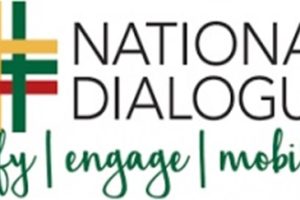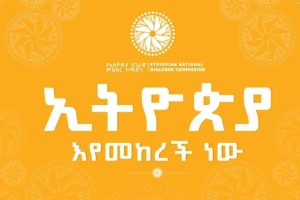
Discussing circumstances and/or facts potentially result in dispute, disparity and disagreements, is the best remedy, though doesn’t work all the time, and either individuals and groups or organized entities or government, are expected to employ this viable weapon to settle upheaval, confusion and commotion.
Cognizant of the fact that close talks, genuine discussions and round table conversations upon problems and disputes can prettily attract consensus, build trust and fraternity, the Ethiopian government has since recently been devising solutions to the long-heaped local, national and regional problems from which the nation is still suffering intermittently or recurrently.
Of the most preferable mechanisms to get the roots of all enmity, inconsistency and contradiction is the establishment of the National Dialogue Commission. This national entity is duty bound to devise myriads of methods to redress a range of peaceful aspects via overcoming multifaceted hurdles.
True, National Dialogue is an increasingly popular tool for conflict resolution and political transformation. It can also broaden debate regarding a country’s trajectory beyond the usual elite decision makers, but a careful means has to be well employed in order not to be misused and manipulated by leaders to consolidate their power. The principles of the National Dialogue to strengthen unity, fraternity and social cohesion need to be well strengthened to help the nation and its people breathe a sigh of relief coming out of the shackles of multifarious problems born to disagreements and rivalry.
A National Dialogue on which Ethiopia has embarked to solve its problems is becoming increasingly a popular tool for conflict resolution and political transformation, of course. Over the past several months, National Dialogue has been proposed and/or carried out among a diverse group of segments of the society and revolved around a range of circumstances.
It is well recognized that there is no one-size-fits-all approach to solve every problem as handling, manipulating and managing it matters the most. The National Dialogue in Ethiopia will have a higher likelihood of success if it incorporates inclusion, transparency, public participation and far-reaching agendum, credible moderator and lucid procedures.
It is also important to make the current National Dialogue in Ethiopia fruitful by helping it have critical scrutiny of the necessary conditions like the issue of unity, human rights respect, equal treatment of citizens, wider public participation in the discussions and lucrative talks among participants. Ethiopians have to work in unison and listen to one another/each other as there might be a number of circumstances under which a National Dialogue is likely to be inappropriate, but making the unthinkable possible is quite promising.
Unequivocally, widely publicized National Dialogue is instrumental in bringing about peaceful means to the fore as a tool for breaking political deadlock and transforming complex disagreements and conflicts, be they are irregular or recurring. Yes, the National Dialogue has continued to gain toehold.
The very important thing here is the process, initiated through political pacts, civil society activism, internationally-brokered peace agreements, or other mechanisms, has been used to address a wide variety of situations thereby coming up with peace and, and even lasting one, if possible within the shortest time possible.
No doubt, since the concept of an inclusive and holistic national conversation has gained popularity, the concept National Dialogue has been used to describe an increasingly heterogeneous set of processes.
Bearing in mind that the national inclusive public discussion held in different parts of the nation must be adapted to national contexts and changing conflict dynamics, a National Dialogue in Ethiopia has been holding should incorporate the concrete political transformation and peace shipment. Basically, an effective National Dialogue convenes a broad set of stakeholders for a deliberative process. All key interest groups should be invited to participate; including women, youth, and other traditionally excluded groups to maximize the dialogue’s potential to address the real drivers of conflict and disagreements. As before the process begins, an inclusive, transparent, and consultative preparatory phase sets the foundation for a genuine National Dialogue, a range of segments of the society are being widely contacted.
For instance, women have been consulted and their role in peace building is told to help them discharge their respective duties and responsibilities. What regional states are doing in relation to this is a case in point. For instance, as to Benshangul Gumuz State, the National Dialogue is a process of rescuing Ethiopia and leaving the age-long difference and challenges that held the nation for too long behind. The National Dialogue allows women to take part and contribute their immense share in resolving Ethiopia’s pressing problems in peaceful manner.
It is also said that women’s National Dialogue participation would also enable them to speak their mind with the sense of belongingness about core national issues. It is crystal clear that women are mostly vulnerable during unrest and they have been subjected to various types of challenges including gender-based violence and sporadic skirmishes.
As engaging women at the National Dialogue is of paramount importance in addressing a range of problems, the country has been employing dialog and consultative approaches to end sufferings and capitalizing on entire society’s naturally gifted behavior of peaceful resolution.
As was learnt from Afar State Women, Social Affairs Bureau, too, the Ethiopian National Dialogue Commission has put commendable efforts to embrace women at the National Dialogue since its establishment. Not only has the commission played a major role in changing the societal perception towards women’s role in peace process but it has also stimulated communal sense of perception. As part of the community that is deeply harmed by conflicts, women need to get space to take part in the dialogue using their naturally gifted character of persuading people, indeed!
Undeniably, women need to engage in national issues with the sense of ownership. They also need to add their ideas which they believe would resolve the problem and myriads of disputes. Undoubtedly, through active participation, women have to engage in setting their agenda, ideas and perception for better realization of the National Dialogue. The initial decision on the shape and structure of a National Dialogue, particularly the youth and other segments of the society, who is invited to participate, can be as intensely political as the dialogue itself. The preparations are carefully and transparently undertaken by the commission that is inclusive of all major groups.
While Ethiopia’s National Dialogue is generally heralded as a success, it is important to note that the dialog has to be inclusive of all stakeholders, groups and even individuals. The dialog has to entertain, transparency and public participation, too. Since a dialogue that includes all major interest groups would lose legitimacy if there are not sufficient opportunities for the public to remain informed about and feed into the dialogue, every citizen has to be well informed about the National Dialogue and close talks.
Besides, these methods are of significantly useful in bringing about peace and peaceful coexistence. Without a shadow of doubt, the broad public participation can be achieved by linking local dialogue processes to the National Dialogue, as well as through public consultations, regular outreach, and coverage in the media. Needless to state, the National Dialogue seeks to reach agreement on key issues facing a country, and fuel efforts geared towards boosting institutional reform, unity, cohesion, among others.
A National Dialogue’s agenda should provide all participants with a substantive conversation around the most key issues. Most importantly, the National Dialogue deserves the attention of all citizenry as a tool with the potential to facilitate peaceful political transformation, but it is no magic bullet.
Even in the most successful instances, National Dialogue is but one step along the long and arduous path of building a peaceful society. These processes consume enormous resources and political energy, sometimes resulting in the government neglecting its basic responsibility to govern and deliver services. National Dialogues can also veer off course or produce suggestions that are never implemented.
As the National Dialogue offers the opportunity for meaningful discussions about the underlying causes of conflict and how to effectively address these issues in a comprehensive approach, by extending the conversation about a country’s destiny beyond the typical circle of citizenry, it has to be well capitalized on.
Certainly, Ethiopia is a country with a proud history of continuing statehood and a magnificent record of anti-colonial struggle against external domination and aggression. It is also an iconic nation for its perpetual legacy as a cradle of human civilization and the leadership of the Pan-African movement. Hence, this country has to solve its internal problems internally, indeed!
To that effect, the dialogue has to address the root causes of the conflict the country has been grappling with for over years now to deal with its painful scars in a sustainable way.
In a nutshell, since National Dialogue has been used to refer to process that is the antithesis of political transformation and peace, it needs to be thrown towards the means bolstering democratic process and lasting peace. It is likely that National Dialogue will continue to be a prevalent tool in the years to come.
It is also an increasingly popular technique for conflict resolution and political reform capable of extending discourse with regard to a country’s trajectory beyond the archetypal influential decision-making bodies, and national conversations have been discussed and conducted over the past few months among a variety of citizens and viable settings.
This noble initiative needs to be as inclusive as possible in order to address the political differences underpinning the root causes of the violent confrontation and its consequent carnage. The intended dialogue for the national consensus in Ethiopia needs to be well consolidated and accompanied by a transitional, restorative justice strategy and means of social cohesion. No profound, lasting peace and reliable and trustworthy understanding can be garnered unless a just, heartily and accountable dialog is held.
Editor’s Note: The views entertained in this article do not necessarily reflect the stance of The Ethiopian Herald
BY MENGESHA AMARE
THE ETHIOPIAN HERALD WEDNESDAY 8 MAY 2024




